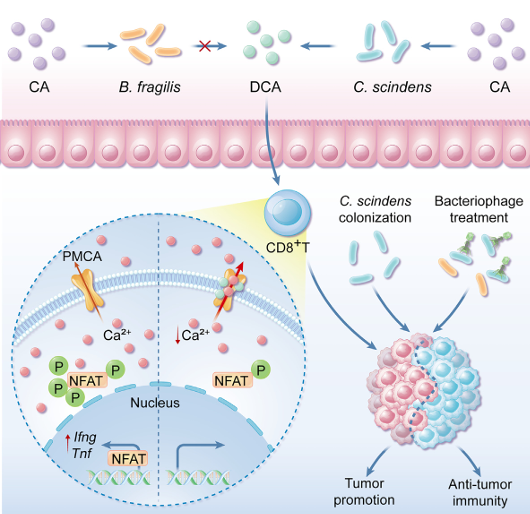Colorectal cancer stands as one of the leading malignancies in the digestive system, ranking third and second in terms of new cases among men and women worldwide, respectively. Given the high incidence of this disease and the low response rate to immunotherapy, it is imperative to identify the environmental impeding factors to devise more precise and effective therapeutic strategies.
A research team led by Professor ZHU Shu and Professor PAN Wen from the Key Laboratory of Immune Response and Immunotherapy of the University of Science and Technology of China (USTC) unveiled the mechanism of tumor immune evasion mediated by the microorganism C. scindens in colorectal cancer. Additionally, they developed a phage-based intervention method. The study was published in Immunity.
The colon is marked by the vast population of intestinal microorganisms. Over the past decades, researchers have discovered that Salmonella typhi (S. typhi) and Fusobacterium nucleatum (F. nucleatum) can pose risks for colorectal cancer by activating the Wnt/β-catenin pathway. Nevertheless, this revelation represents only a fraction of the influence that the 1013 bacteria residing in the intestine exert on the host.
In previous studies, the research team, collaborated with the research group led by Professor CHU Bo from Shandong University, revealed that the intestinal tract of patients with colorectal cancer was enriched with Peptostreptococcus anaerobius (P. anaerobius). P. anaerobius had a negative impact on tumor prognosis. In fact, not only were there a large number of epithelial cells distributed in the intestine, but more than half of the immune cells and over 70% of T cells in the human body were distributed in the intestine, the largest mucosal immune organ.
CD8+ T cells are crucial immune cells that possess the ability to activate and eliminate tumor cells through various mechanisms. In the context of colorectal cancer, the infiltration level and gene expression pattern of CD8+ T cells play pivotal roles in determining the prognosis. Nevertheless, the understanding of the intricate relationship between dysfunctional CD8+ T cells within the tumor microenvironment of colorectal cancer and intestinal bacteria/metabolites remains limited. Additionally, there is a dearth of knowledge regarding the specific bacteria/metabolites that exert an influence on the anti-tumor function of CD8+ T cells.
To identify bacteria and metabolites that regulated the anti-tumor function of CD8+ T cells, researchers constructed a library of small-molecule metabolites derived from intestinal microbes. Through rigorous in vitro screening and in vivo validation, they discovered that the secondary bile acid, deoxycholic acid (DCA), produced by C. scindens via the bai operon, effectively suppressed the effector function of CD8+ T cells and promotes the growth of colorectal cancer.

Graphical abstract of the related paper (Image by USTC)
Further investigation revealed that DCA potentially bound to the plasma membrane calcium pump, plasma membrane Ca2+ ATPase, enhancing its activity and promoting the extrusion of Ca2+. This process ultimately weakened the effector function of CD8+ T cells.
Blocking the biosynthetic pathway of bacterial DCA effectively inhibited the suppressive effect of bacteria on the effector function of CD8+ T cells, thereby blocking the influence of DCA on tumor growth in mice. Specifically targeting and lysing C. scindens with bacteriophages effectively suppressed the immunosuppressive and tumor-promoting effects of C. scindens.
The study reveals a novel pathway of interaction between the intestinal microbial ecosystem and the tumor immune microenvironment, offering potential implications for mitigating the immunosuppressive effects of specific microorganisms.
paper link:https://doi.org/10.1016/j.immuni.2024.02.014
(Written by ZHANG Min, edited by HUANG Rui, USTC News Center)